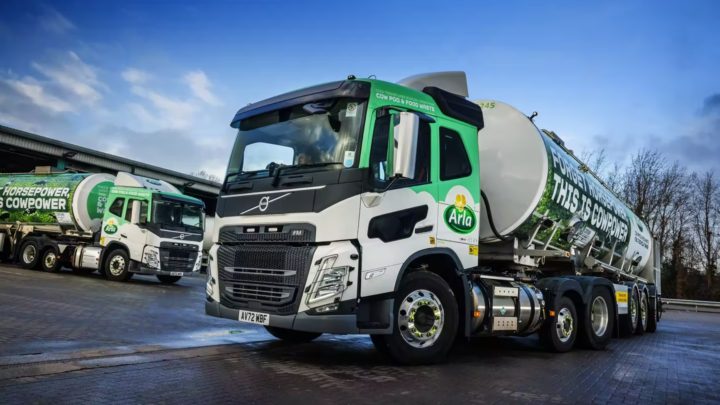
The UK’s biggest dairy cooperative currently views bio-LNG (liquified natural gas) as the best option to improve the sustainability of its commercial vehicle fleet and opts for Volvo, having trialled its gas technology against another manufacturer.
Supplied by Volvo Truck and Bus Centre South and East, the new FMs come equipped with sleeper cabs. They will be used for back-to-base operations collecting and delivering milk from Arla’s farms and depot operations in Leeds and Burton-On-Trent to processing sites across the country.
Richard Wilson, inbound logistics director at Arla Foods, says: “We have some ambitious sustainability targets to meet in the coming years, and reducing emissions from our logistics operations will be key to helping us meet these. We have trialled dual fuel vehicles, which proved successful, but these new units are an even bigger step up for us.
Turning cow waste into renewable fuel
“We are now turning cow poo from our farms and food, which would otherwise go to waste, into a source of renewable fuel. These new bio-LNG trucks will play a crucial part in our plans to hit our 2030 sustainability targets – which is a 63 per cent reduction of CO2 against our baseline from 2015 for our own fleet operations.
The FM LNG benefits from Volvo’s unique approach to gas engine technology, using small amounts of diesel to initiate the ignition of the air-fuel mixture. This enables the Volvo G13C engine to deliver the same 460 hp and 2,300 Nm of torque as a standard 460 hp diesel, with matching driveability, reliability and service intervals.
The gas powertrain also provides engine braking just like a regular diesel tractor unit – without needing a separate retarder that adds weight and complexity. Paired with Arla’s eye-catching milk tanker trailers, the new FMs are expected to cover 200,000 km per year and have been backed with five-year Volvo Gold contracts to guarantee maximum uptime.
What the future holds for electric and hydrogen technology
They will refuel at Gasrec’s flagship open-access site at Daventry International Rail Freight Terminal (DIRFT) and the Gasrec built station at Reed Boardall’s depot, in Boroughbridge.
The seven FM LNG trucks replace seven diesel tractor units in Arla’s commercial vehicle fleet.
Richard Wilson continued: “Who knows what the future holds in terms of electric and hydrogen technology, but for now and the medium term, we believe trucks powered by bio-LNG are the best route for us to make a significant carbon reduction in the fleet.”
